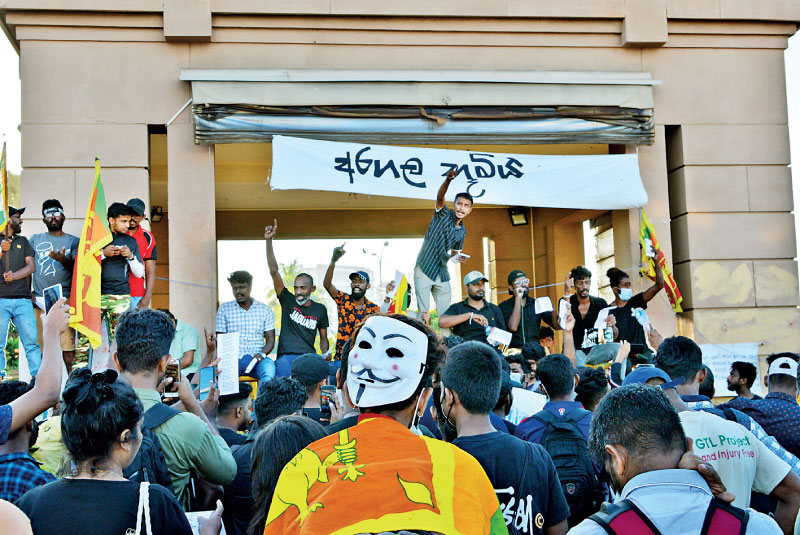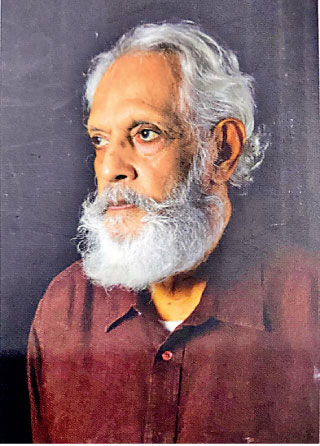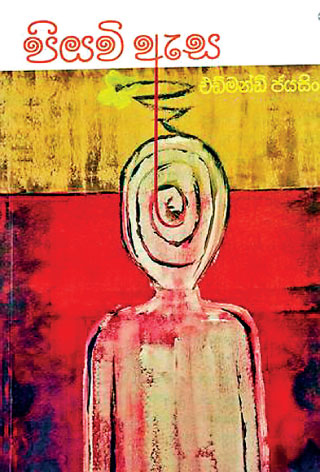Monday Feb 16, 2026
Monday Feb 16, 2026
Monday, 18 April 2022 00:27 - - {{hitsCtrl.values.hits}}

|
Youth are in an unarmed struggle with the regime
Sri Lanka’s youth are in rebellion once again. This is the fourth rebellion they have launched against the existing administration at the time in the past five decades. There is a difference in the present rebellion because, unlike the previous three which were violent and had been organised by certain individuals, it is unarmed and spontaneous.
But there is a chain of events that are linked to each other that had led to the current event. First, it was farmers who took to the street demanding chemical fertilisers and pesticides to continue in farming. Then, consumers agitating for fuel, cooking gas, and milk foods took to the streets. This had spread like a wildfire throughout the country. Yet, the Gotabaya Rajapaksa administration paid a deaf ear to these agitations. Its ministers and chief policy leaders were repeatedly telling the country that there was no problem and they have taken appropriate measures to lead the country along the designed path to prosperity.
Hence, there will be a bright future for all Sri Lankans, they assured, under the Gotabaya Rajapaksa administration. This was not believed by people because there was a wide ‘trust deficit’ between the Gotabaya Rajapaksa administration and them. Hence, instead of dying down, the agitations began to spread each time with a renewed vigour and in a new form.
Then, the administration resorted to suppressive manoeuvres like invoking emergency laws and long curfews. They became unsuccessful because people defied those laws and still came out in the streets in thousands to protest against the Government. At the same time, there was an internal rebellion within the Government causing it to lose the two-third majority in Parliament and possibly the majority power as well. Noticing this and fearing that his emergency proclamation would be rejected by Parliament, he cancelled the emergency rule. Then, he tried out some internal reforms in the form of the resignation of the Cabinet ministers except the Prime Minister and extending an invitation to the Opposition to form or join the Government. This also failed.
In these circumstances, the youth organised a protest campaign through social media with the hashtag GotaGoHome. This was the birth of the current sit-down protest in front of the President’s Secretariat. Contrary to expectations of many that it would not succeed, it grew in numbers by the day and now its slogan has changed to calling all Rajapaksas to step down. By the time this article goes to press, this protest has entered its 10th day. No one knows its outcome, but it does not augur well for the continuation of the Gotabaya Rajapaksa administration.
 |
| Edmond Jayasinghe |
 |
| Edmond Jayasinghe's Piyavi Esa
|
Gotabaya regime has bankrupted the country
The protesters cannot be faulted because the Gotabaya Rajapaksa administration has now bankrupted Sri Lanka’s economy both externally and internally. Externally, the country has run out of foreign exchange to service the Government’s foreign debt. Accordingly, the Central Bank and the Ministry of Finance together have decided to suspend all foreign debt repayments falling due after 5 p.m. of 12 April. Internally, the Government does not raise sufficient revenue to finance its normal expenditure programs and if not for funding by the Central Bank, it cannot repay even the maturing domestic debt.
This is due to several policy folles which the Gotabaya Rajapaksa administration has made since it came to power in November 2019. The list is long, but the main ones are the loss of revenue through attractive tax concessions, destroying the country’s agriculture by trying to convert it to organic farming overnight, borrowing from the banking sector excessively causing the money stock to rise and consequently, domestic inflation to set in, foreign reserves to fall, and exchange rate to depreciate. When this was happening, independent economists advised the government to seek funding from IMF.
The administration stubbornly refused this claiming that it has an alternative policy or homegrown policy to rescue the country. The alternative policy was proposed by Governor W.D. Lakshman and the homegrown by Governor Ajith Nivard Cabraal. Both of them have lost their office one after the other. The result of these policies was an acute shortage of foreign exchange in the market creating queues for the same. Instantly, a vibrant black market spontaneously sprang up with a wide margin there.
The country failed to import essential raw materials for agriculture and industries, and fuel, cooking gas, milk food, and other food items for use by consumers. It caused businesses to either close or perform at a low level. The shortage of essential items in the market created queues for same putting people in the queues instead of working or engaging in income earning activities. When these policies hit both the ‘purse and the stomach’, people came out in protest. It is these protests that have now been elevated to continuous youth rebellion first in front of the President’s Office and now in the regional centres as well.
The military suppression of the youth will not work
Will this youth rebellion be successful? We cannot say it now because the Government has not yet launched its suppressive attacks on the protestors. In the past, all three youth rebellions were crushed by the respective governments using their draconian powers. On this occasion too, it might resort to its old tactic. But if the Gotabaya administration resorts to this, it will lose everything because the unarmed protests are being endorsed by all responsible leading citizens of the country.
The bloodbath that would ensue on attacking an unarmed group of protestors, a cross-section of society, will isolate the Gotabaya administration not only in the domestic scene but also globally. When this happens, its current saviours, India and China, will surely distance themselves from the administration. Worse, it will not be able to secure the much-needed financial facility from IMF. Therefore, the administration should think twice before resorting to such a tactic. If it does not, its existence as a political power is numbered.
Edmond Jayasinghe’s Piyavi Esa
In this background, the appearance of a novel in Sinhala titled Piyavi Esa or The Naked Eye by diplomat turned novelist, Edmond Jayasinghe, his maiden attempt, is timely and enlightening. The protestors and civil society leaders can learn from Jayasinghe how a good intentioned social movement could fail not because of attacks from outside, but because of the ideological deficits and rivalry among the groups agitating for the change in the system.
A reformer coming from an aristocratic family
Jayasinghe’s novel spans over five decades starting from the colonial Ceylon to the first JVP insurrection in 1971. The story is wound around two families, one an aristocratic that tries to maintain its social supremacy and the other a newly rich that seeks to regain lost opportunities by being a part of the newly emerging system. The story is narrated by the elder son, Hewavitharana, of the aristocratic family which has received its wealth, lands, social recognition, and titles by being loyal servants to the Kandyan kings validated by the British too for their benefit.
From a very young age, Hewa does not wish to run this family empire as his father and forefathers had done for centuries. This worries his father who had been a district officer under the British rule, but losing that status because of his anti-British and pro-Sinhala Buddhist stance. However, he is a person who values the family status above everything. When Hewa wanted to start a poultry farm in his ancestral land, father disapproves it claiming that his family had not earned its livelihood by killing animals.
The main character is a rebel of a different kind
Hewa was a rebel from his early childhood, but a man with foresight. He did not want to join the civil service and bring the old glory back to his family, as his father had wished. The testing of his ability to see through the future has been presented by Jayasinghe narrating the episode of his first love affair with a cousin. When the girl is to be given in marriage to a stranger, she suggested to him that they should elope by taking the family jewellery as a seed fund for their new life. He analyses this proposal and finds that it will not do any good to the girl. Hence, he rejects the proposal.
Unlike the son and daughter of the newly rich family, Karunarathna and Nirmali, he is not a very bright person in studies. However, he passes the entrance exam to the University of Peradeniya and joins the Arts Faculty to do a special degree in sociology. Meanwhile, Karunarathna too passes the entrance exam to the newly established Vidyodaya University and joins its Arts Faculty to do a degree in arts subjects. His goal is to become a civil servant one day.
While studying at Peradeniya, Hewa meets its Dean and the Head of the Department who coach him personally to launch a new movement to change the social, cultural, economic, and political landscape of the country. They recognise there is a need for launching an ideological revolution through peaceful means to attain that goal. That was how the new movement, ‘The Naked Eye Movement’, was born under his ideological leadership. Some likeminded students at Peradeniya join him. When he tried to recruit Karunarathna to the movement, he laughs it away saying he has more important goals in life than changing the existing society. Meanwhile, his younger brother and Nirmali too join Peradeniya and start doing a degree in law. His younger brother has no interest in the movement, but Nirmali does. They both begin an asexual relationship to reach their goal.
The demand of the Children of 56
The world around this aristocratic family undergoes a rapid change unknown to Hewa’s father or other member of the family. A new group called ‘Children of 56’ has been started in the village and they demand the land belonging to the family be transferred to the tenant farmers who had tilled that land for generations. Hewa accepts it as a reasonable demand and agrees to do the needful after speaking to his family members. Many years later, he manages to convince his father of the need for doing it and delivers his promise. Hewa starts writing to newspapers articles outlining the vision and philosophy of the Naked Eye Movement. Nirmali, his asexual partner, is always behind him in this enterprise.
Study tour in Nordic countries
His articles have caught the eye of the Swedish Embassy in Colombo and invites the couple to make a study visit to Nordic countries – Sweden, Norway, Finland, Iceland, and Denmark – to learn of how they had achieved that goal without shedding blood. The Dean of the Faculty encourages them to accept the invitation and make the study tour. Jayasinghe now brings in his experiences as a diplomat to tell the readers of the wonderful gains these countries have made. The month-long tour in the Nordic countries solidifies vision and mission of the couple that that is what should be done to change the decadent Sri Lankan society. The main idea of the movement is that it should be non-violent, and people should be ideologically empowered to attain their goal. It is an apolitical movement maintaining its independence.
The Naked Eye Movement
Hewa gets a first class in the final exam and joins the faculty as an assistant lecturer. One year later, so does Nirmali. They are now free to devote their energy, time, and money for the movement and they do so. At the same time, Karunarathna also passes out from Vidyodaya with flying colours and joins the civil service. As before, unlike his sister, he has no interest in changing the society. He wants to rise in the ladder and become a top civil servant one day.
Militant political movement destroys the unarmed social movement
Around this time, a violent political movement takes root at Peradeniya and other universities. They are opposed to Jayasinghe’s naked eye movement because it has become a competitor to their goal. They start attacking the duo ideologically, verbally, and physically. Because of the mud-slinging campaign they launch against them, they register their marriage without informing either family. The campaign continues but all of a sudden, the militant revolutionary movement starts launching its war against the government. As a precaution, Hewa is arrested and kept in a detention centre.
At the detention centre, he is physically attacked by the members of the militant movement and becomes a cripple lying on his back in a bed because of a damage done to his spinal cord. He is released from detention, but he cannot attend to his personal requirements now. Nirmali like a good wife does everything to keep him alive. His health deteriorates and he is now on the door to his next life. At the request of many, he narrates his story and that is how we have got this super novel from Edmond Jayasinghe.
Lessons from Jayasinghe’s Naked Eye
The present unarmed protestors are taking forward what Hewa of Edmond Jayasinghe could not accomplish. I recommend that they all should read his novel because it is a manual for them.
What are the lessons which the present protestors can learn from Jayasinghe? One is that without an ideological change, you cannot change society. The other is that enemies will come not from outside but from within. Such enemies who work in their own personal interest will deliver a fatal blow to any social movement. Hence, Jayasinghe leaves the message that those who plan to change society should be wary of these enemies from within. The rulers will capitalise their dissent and crush the movement without firing a single bullet at them.
Edmond Jayasinghe who has received his education and worked in his career in English has a competency in Sinhala which makes us envy of him. In my view, his first attempt is an enormous success.
(The writer, a former Deputy Governor of the Central Bank of Sri Lanka, can be reached at [email protected].)